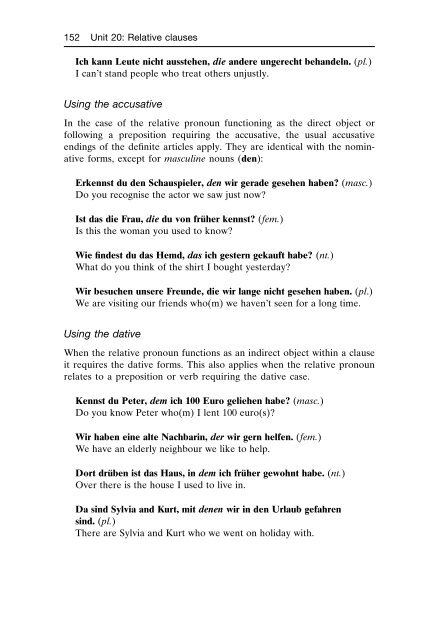Intermediate german
You also want an ePaper? Increase the reach of your titles
YUMPU automatically turns print PDFs into web optimized ePapers that Google loves.
152 Unit 20: Relative clauses<br />
111<br />
2<br />
3<br />
4<br />
5<br />
6<br />
7<br />
8111<br />
9<br />
1011<br />
1<br />
2<br />
3<br />
4<br />
5<br />
6<br />
7<br />
8<br />
9<br />
2011<br />
1<br />
2<br />
3<br />
4<br />
5<br />
6<br />
7<br />
8<br />
9<br />
3011<br />
1<br />
2<br />
3<br />
4<br />
5<br />
6<br />
7<br />
8<br />
9<br />
4011<br />
1<br />
2<br />
3<br />
41111<br />
Ich kann Leute nicht ausstehen, die andere ungerecht behandeln. (pl.)<br />
I can’t stand people who treat others unjustly.<br />
Using the accusative<br />
In the case of the relative pronoun functioning as the direct object or<br />
following a preposition requiring the accusative, the usual accusative<br />
endings of the definite articles apply. They are identical with the nominative<br />
forms, except for masculine nouns (den):<br />
Erkennst du den Schauspieler, den wir gerade gesehen haben? (masc.)<br />
Do you recognise the actor we saw just now?<br />
Ist das die Frau, die du von früher kennst? (fem.)<br />
Is this the woman you used to know?<br />
Wie findest du das Hemd, das ich gestern gekauft habe? (nt.)<br />
What do you think of the shirt I bought yesterday?<br />
Wir besuchen unsere Freunde, die wir lange nicht gesehen haben. (pl.)<br />
We are visiting our friends who(m) we haven’t seen for a long time.<br />
Using the dative<br />
When the relative pronoun functions as an indirect object within a clause<br />
it requires the dative forms. This also applies when the relative pronoun<br />
relates to a preposition or verb requiring the dative case.<br />
Kennst du Peter, dem ich 100 Euro geliehen habe? (masc.)<br />
Do you know Peter who(m) I lent 100 euro(s)?<br />
Wir haben eine alte Nachbarin, der wir gern helfen. (fem.)<br />
We have an elderly neighbour we like to help.<br />
Dort drüben ist das Haus, in dem ich früher gewohnt habe. (nt.)<br />
Over there is the house I used to live in.<br />
Da sind Sylvia and Kurt, mit denen wir in den Urlaub gefahren<br />
sind. (pl.)<br />
There are Sylvia and Kurt who we went on holiday with.



